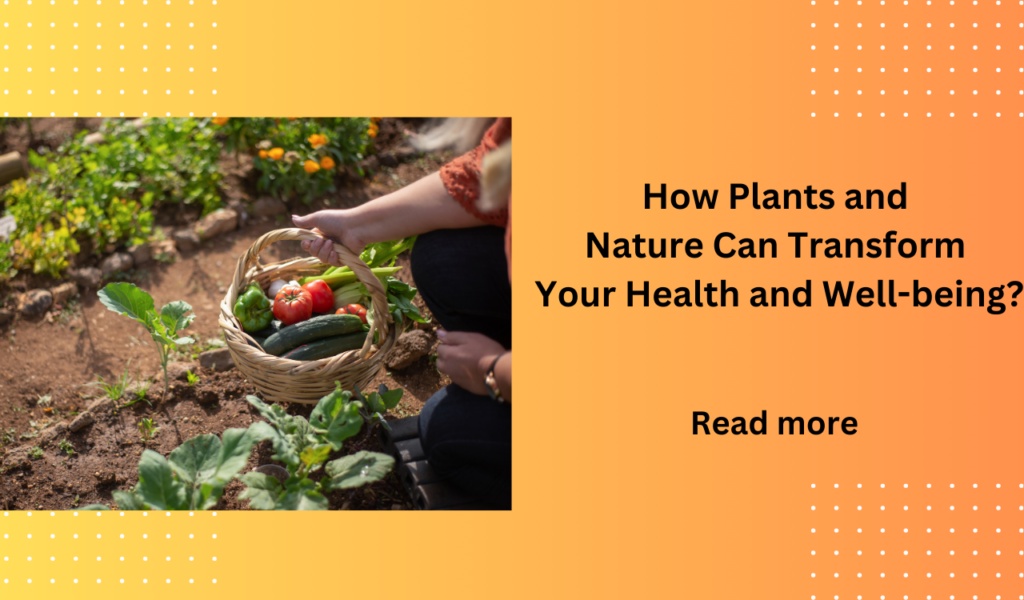Plants and nature have a profound effect on well-being by delivering both physical and cerebral benefits. Incorporating plants into your environment through indoor greenery or outdoor gardens can improve air quality, reduce stress, and boost mood through their calming presence. Natural settings, similar as grounds and forestlands, offer remedial gests that lower cortisol levels, better immune function, and promote cerebral clarity. Whether gardening, hiking, or spending time outside, engaging with nature promotes relaxation and internal revivification, pressing the integral part of plants and nature in promoting holistic health and well-being.
Connection Between Plants, Nature, and Health.
The connection between plants, nature, and health is profound and multifaceted.
Exposure to natural environments and plants has lowered cortisol levels, reduced stress, and promoted relaxation.
Interaction with nature and greenery can improve mood and emotional well-being, possibly reducing symptoms of anxiety and depression.
Plants help filter pollutants and produce oxygen, improving indoor and outdoor air quality.
Being in a natural climate and around plants can boost the immune system and help the body fight off disorder.
Natural atmospheres can restore attention and cognitive function, adding focus and internal clarity.
Time spent in nature or around plants can foster creativity and problem- cracking chops.
Green spaces and gardens encourage physical activity, such as walking, gardening, and outdoor sports, which are beneficial for overall health.
Engaging in gardening and plant care is used as a remedial tool to better recovery and internal health.
Environments filled with nature and plants are often used in healthcare settings to promote faster recovery and provide relaxation.
Community gardens and green spaces provide opportunities for social interaction, foster a sense of community, and reduce feelings of isolation.
Exposure to nature and plants can enhance literacy in children and support cognitive development.
Plants offer a variety of sensitive gests , from visual beauty to tactile sensations, which can be advantageous for cognitive and sensitive development.
Healthy ecosystems support human health by providing clean water, air, and fertile soil, which are essential for food production and overall well-being.
Humans have an innate connection to nature and interactions with plants and the natural environment can satisfy this intrinsic need and contribute to overall health.
Incorporating plants into daily life, whether through gardening or simply being around greenery, promotes a lifestyle that supports long-term health and wellness.
Nutritional Benefits of Plant-Based diet that help-full in healthy life.
A plant-based diet offers many nutritional benefits that contribute to a healthy lifestyle. Rich in vitamins, minerals, fiber, and antioxidants, plant-based foods help reduce the risk of chronic diseases such as heart disease, diabetes, and certain cancers. Fruits, vegetables, whole grains, beans, and nuts provide essential nutrients like vitamin C, potassium, and folate while being low in saturated fat and cholesterol. The high fiber content aids digestion, supports healthy weight operation, and stabilizes blood sugar levels. Including a variety of plant- based foods ensures a balanced intake of nutrients, promoting overall health and vitality.
Psychological Benefits of Having Indoor Plants.
Having indoor plants provides important psychological benefits by boosting mood and reducing stress. The presence of greenery creates a calming environment that promotes mental well-being and promotes relaxation. Studies show that tending to plants can reduce anxiety, better focus, and increase happiness. The act of nurturing plants promotes a sense of accomplishment and connection to nature, which can be especially soothing in a busy, urban atmosphere. also, the natural beauty and vibrant colors of inner plants can elicit positive feelings and produce a further inviting and affable living space.
Benefits of Spending Time in Nature.
Spending time in nature has numerous benefits that significantly increase well-being.Immersing yourself in natural surroundings can reduce stress levels, better mood, and enhance overall internal health by promoting relaxation and reducing anxiety. Physical health also benefits, as open-air activities similar as walking or hiking better cardiovascular fitness and strengthen muscles. Exposure to nature can refresh the mind, enhancing cognitive functions similar as focus and creativity while delivering a stimulating break from the daily routine. also, natural atmospheres frequently encourage social relations and physical exertion, which contribute to a more balanced and fulfilling life.
Activities to Connect with Nature.
Connecting with nature can be both enriching and revitalizing through a variety of exertion. Simple but effective ways include going for a walk or hike on the original ground, engaging in gardening, or rehearsing open-air yoga. Exploring nature trails or forests, bird watching, and camping offer immersive gests that foster a deeper connection with the environment. Even everyday activities like sitting in a garden or enjoying a picnic in a green space can enhance your connection with nature. These activities not only give physical benefits but also promote peace of mind and a lesser appreciation for the natural world.
Practical Tips for Integrating Plants and Nature into Your Life.
Incorporating plants and nature into your life can be both easy and satisfying. Start by adding indoor plants to your living spaces, choosing varieties that thrive in your home environment, such as succulents or pothos. Incorporate regular open-air activities to increase your connection with nature, similar to walking on original grounds or maintaining a small garden Consider creating a tranquil outdoor retreat with comfortable seating and greenery. also, bring nature indoors by using natural materials, similar as wood accents or stone rudiments, in your scenery. These practical way can better your atmosphere, better your well- being, and promote lesser harmony with the natural world.
Encouragement to Embrace a Greener Lifestyle.
Adopting a green lifestyle is not only beneficial for the environment but also enhances personal well-being. By making simple, sustainable choices — like reducing waste, choosingeco-friendly products, and eating further plant-based foods — you contribute to a healthier earth while perfecting your quality of life. are espousing green practices similar to gardening, using energy-effective appliances, and supporting original, sustainable businesses can lead to a lesser sense of fulfillment and connection with nature. Every small step towards a green life makes a positive impact, creating a ripple effect that benefits both you and the world around you.
Scientific Studies and essays on plants’ effect on healthy life.
Scientific Studies and essays on plants’ effect on healthy life. Scientific studies and articles show overwhelming evidence of the positive goods of plants on health and well- being. exploration shows that indoor plants can significantly boost internal health by reducing stress and perfecting mood, as stressed in a review published in the Journal of Environmental Psychology. also, exposure to natural surroundings has been linked to bettered cognitive function and attention, according to a comprehensive review in Frontiers in Psychology. Gardening has also been linked to better physical health and increased fitness levels, as detailed in the British Journal of Sports Medicine. also, indoor plants have been shown to better air quality and respiratory health, as documented in environmental science and pollution exploration. These studies inclusively indicate the multifaceted benefits of integrating plants into everyday life.



